The Man Who Cannot Die (and the Man Who Did)
By Mento 2 Comments
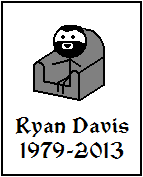
Hey friends. We've all been profoundly affected by Ryan's passing as evidenced by the sheer mass of obituary blogs, artwork, video compilations and well-wishers from Twitter, NeoGAF, Reddit, Hollywood Life (for some reason) and other places too numerous to mention. Before and after hearing the news I was playing a little game called Planescape: Torment - an Infinity Engine RPG far more story-driven than its contemporaries that focuses on an immortal seeking his past and, eventually, a way to end the constant cycle of death and resurrection. As you might suspect given the events that transpired in real life midway through the playthrough, what began as a fascinating and amazingly imaginative journey to solve a mystery took on something of a melancholy edge. I shouldn't let external matters factor into my appreciation of a game, but it was a little hard to avoid it in this instance.
I've already said my piece about Ryan. I wrote a list that I felt represented the man I knew from the window through which he allowed us to enjoy and appreciate his outspoken voice, the wisdom acquired from over a decade in the industry and his bellicose sense of humor: his video content. The larger than life figure in those videos is how most of us knew Ryan Davis, with the exception of those fortunate enough to encounter him at an expo or some such event or had worked alongside him and could count him among their close friends. As such, this won't be another Ryan obituary blog - we have plenty already and many are able to talk about him with far more grace and poignancy than I am able to muster. I just wanted to acknowledge his passing in the first few paragraphs because such a topic is hard to avoid right now. Rest in peace, duder.
With all that said, I'll be discussing Planescape: Torment in a little more detail below.
What Can Change the Nature of a Man?
It's quite difficult to collate my thoughts on Planescape: Torment. I have so many; the game is incredibly dense in that regard with the questions it poses and the themes it explores. There's the nature of redemption and regret, of pragmatic evil and passionate good (and, indeed, of pragmatic good and passionate evil), of companionship and loneliness, of a man whose total lifetime seems to exceed that of entire worlds.
However, as much as I'd love to talk about what a fascinating character the Nameless One is, or his many adventures across the extra-dimensional planes of the Planescape setting or even his ragtag band of recruitable companions, to do so would in some partial way detract from someone's enjoyment of their first trip through Planescape: Torment. As such, I've split this appraisal blog into two parts: One meant for those who have never played the game but might one day intend to, to whom I can describe why I liked this game so much without spoiling a thing; and another for those who have reached the game's conclusion with whom I can discuss some of the finer details of the game in a setting where spoilers are acknowledged.
"Hey Chief." (Novices)
So what is Planescape: Torment? Well, the Giant Bomb wiki page I highlighted will probably fill in many of the minor details: It's a D&D PC RPG based on the Planescape setting, a particularly esoteric campaign setting for the D&D universe that kind of ties all the other settings together. It was made using the Infinity Engine - the same isometric RPG engine that begat the Baldur's Gate and Icewind Dale games. Your character wakes up on a mortuary slab in a massive city that sits in the center of the known universe and, initially, your only companion is a garrulous, wisecracking floating skull named Morte. It's with this opening that the game presents both its main mystery and the driving force for all of the quests to follow: Who are you? And why can't you die?
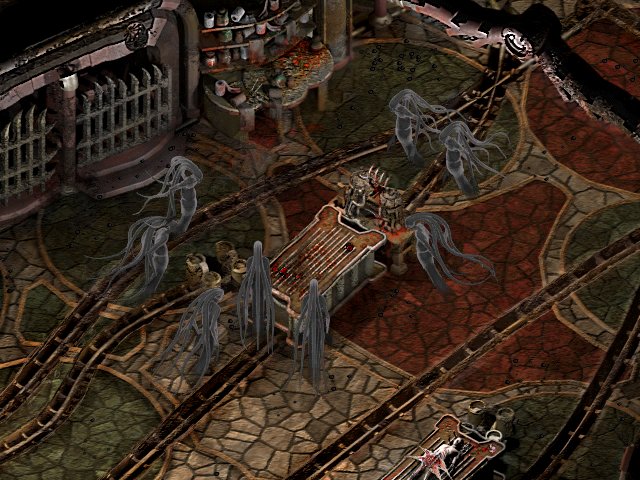
It's a little difficult to get used to Planescape's world initially. The Planescape setting has had the benefit of decades of writers and game designers working at it constantly: building its worlds, its characters, its ideologies and its rules. The detailed workings of the various planes are very rarely delved upon to many players of the table-top game on which this RPG is based. For the most part, the Planes outside the Prime Material (which would just be the normal world with kobolds and elves and the like, which houses almost all the other D&D campaign settings like Forgotten Realms, Birthright and Greyhawk) are considered suitable only for high-level players: the sort of late-game destination a party might head into when - and often only when - the DM decides they're powerful enough to survive the journey. If you've played games based on Forgotten Realms before, you might be familiar with a region known as the Underdark: a great subterranean land full of dark elves and tough monsters that a game might take the party after it hits something like level 8 or higher; there's a reason you only head there in Baldur's Gate 2 and not the comparatively low-level first game. The Planes are considered even deadlier territory, and require a considerable amount of wisdom and knowledge to explore competently without finding oneself completely lost or, worse, unceremoniously dumped into a Hell dimension (of which there are actually several, but let's not get too bogged down in details here).
The Planes are endlessly fascinating however, and because most of their mystique was a conscious design decision during their creation the game itself won't deign to explain much of what you see: only the vague general understanding of them from NPCs who know a little more about the planes than you do. This is particularly true of the enigmatic Lady of Pain: The de facto leader of Sigil and the blade-maned woman that adorns much of the game's art. Part of the enjoyment of Planescape: Torment is witnessing all this weirdness for yourself and reading what little amount of information is available on them. It's an extremely text-heavy game but rarely do you find a world this immersive, either due to its alien charm or its very well-written exposition. If you played Mass Effect because you heard how well-defined its sci-fi universe was and how well written its characters and story, you owe yourself a playthrough of Planescape: Torment at some point for similar reasons. ME's excellent worldbuilding feels like it was based somewhat on the lessons learned from developing Torment (though most of Black Isle's developers went on to join Obsidian Entertainment, as is my understanding), yet all the same is merely standing on the shoulders of a giant.
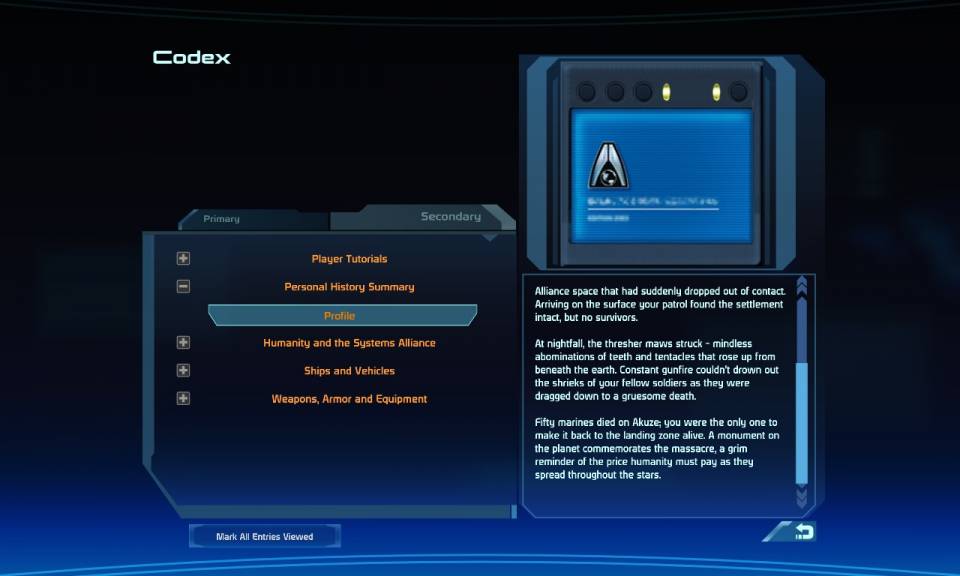
As for the game itself, well. It's a lot like all the Baldur's Gates et al, though certain liberties are taken with how you develop your character and how little emphasis is placed on combat. For the first part, while your companions grow stronger and gain new abilities, The Nameless One doesn't so much grow stronger as remember. He remembers past lives, past careers and past decisions his previous incarnations took. Subsequently, anything that jogs his memory tends to include a hefty experience point bonus as he edges closer to the person (or people, really) he once was. The rest of the game's unusually large XP boosts come from solving quests and choosing the wisest dialogue options: experience gained from killing enemies barely registers as a blip in many cases. As such the game is heavily weighted towards discussion, contemplation and exploration. While there definitely is combat, it all seems rather perfunctory. You kill things because they're in the way between you and solving a mystery, or because you weren't smart or charismatic or sneaky enough to escape a conflict. It's a brilliant subversion of what is generally the norm for a video game RPG and, I can only surmise, is a big part of why the game is endearing to so many: There aren't many RPGs out there that actually try to engage a player's role-playing tendencies, rather than follow the usual cyclical blueprint of combat and loot and leveling up.
This sort of game has actually been something of a theme with me recently. I also played Troika's Vampire: the Masquerade: Bloodlines not too long ago and it, like Planescape, is a game that rewards players more for engaging with the story it has set out for you rather than unconsciously batting down every foe that comes your way and clicking your way past the talky parts to get back to fighting. Both games have combat, but they're easily the weakest element of their respective game and it seems like the designers made the lackluster combat almost intentional so you'd avoid it as often as possible in favor for the cerebral option. As such, I can't say that either game is perfect, but both are extraordinary in the sense that they respect a player's intelligence; that they address the player as a fellow avid reader of fiction who wishes to consume new tales in a format that can offer unique storytelling opportunities. The designers seem far more interested in how it can use the format of a video game to tell a story in a novel way than trying to challenge the Diablos and World of Warcrafts by building a mechanically-appealing experience of tactical combat and pursuing ever bigger numbers. Personally, I can see plenty of room for either approach in this medium.
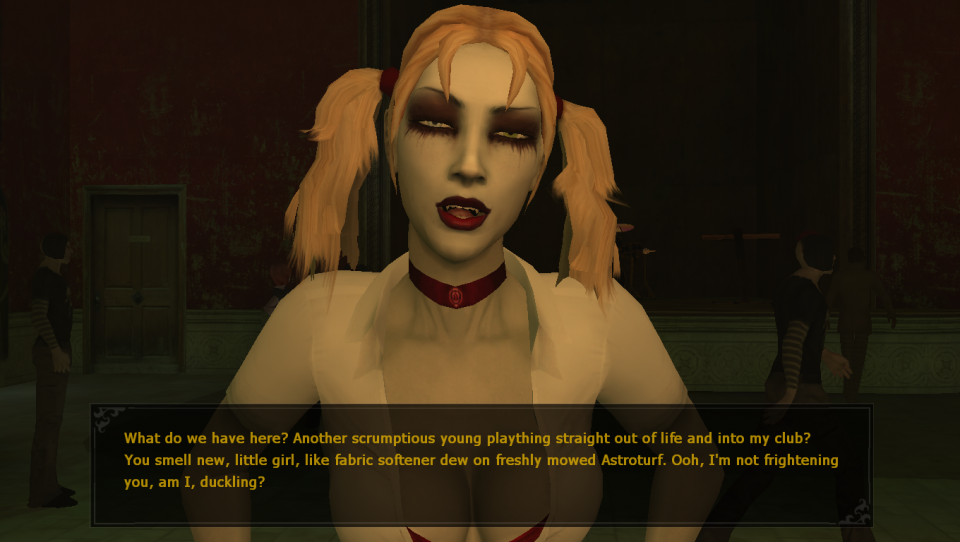
So, to summarize: If you keep in mind that Planescape: Torment doesn't offer much from a mechanical perspective, and that it is actually quite dated in many ways regarding its mechanics, combat and graphical prowess, it's a truly novel game and absolutely worth your time. It's fantastically written and the plot and setting never skimps on wonder or intrigue. It's also relatively short which, to me, is actually something of a benefit these days with what little time most people either have or are willing to spend on a game before getting everything they want out of it and deciding to move on. If you're on the fence and have been in the decade+ since it came out, I maintain that it still holds up. Plus there's really nothing much else like it out there.
"I Think Therefore I Am. I Think." (Experts)
This is the spoiler-filled area. You have been warned. There's nothing much else to read after this, so feel free to head to GOG and buy yourself a copy of Planescape: Torment if you don't already have one. Or wait until that D&D Pack with all the Infinity Engine and Neverwinter Nights games is back on sale. That thing is such good value.
Since I want to spook away any remaining neophytes, let's move right onto the ending of the game. If you had the mental wherewithal (or a FAQ open) to have that Brass Sphere in your possession come the final encounter with the Transcendant One, the Nameless One becomes something of a demigod as it finally recalls the memories of the first incarnation. I love how many questions this raises: This original incarnation is by far the most powerful, but is also the one who was a mortal human being. In order to become as strong as he was, he must've done a hell of a lot of leveling up in his relatively brief lifetime. Coupled with this is the knowledge that whatever he did has damned him for all eternity with no chance of extra-planar parole raises an even more interesting question. Given that every ending bar the ones where you entirely negate yourself out of existence drops you in one of the Hell dimensions to continue the Blood War - that endless battle between lawful evil devils and chaotic evil demons - makes me wonder if there wasn't going to be a sequel at some point. Yet my dude was around level 25 all told, which is often when the DM takes you aside politely requests that you roll up a new character, because there's not a whole lot left he can challenge you with short of the fantasy equivalents of Satan or Yahweh, and even they wouldn't be particularly confident to come out of that fight as the victor. So I kind of loved the conclusion for this and other reasons, as much of a downer as "being dragged down to Hell to serve eternal punishment for one's crimes" was (which is apparently the "best ending" too).
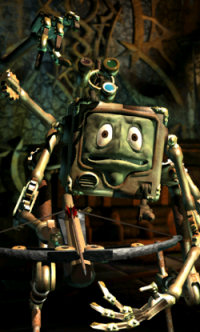
I didn't bring Ignus along, since I was a Lawful Good character for most of the game and couldn't really see how an irredeemably malevolent arsonist wizard (sort of like the Inhuman Torch, if a certain recent Futurama episode hadn't made that joke already) would be on board with what I was going for. I also didn't have room for Vhailor and couldn't come back to where he was, so I just unmade the poor guy by presenting him with a logical paradox. From all accounts, he's a good meatshield and a horrible discourse companion. Which means I had all the rest: The ever-loyal comic relief Morte, of course. There was the love interest tiefling Annah who I was always a little guilty about courting/not-courting given her obvious affection towards the Nameless One and how I knew his journey would end in a way that would make a coupling impossible. I picked up Fall-From-Grace because I needed a healer and while a friendly succubus isn't that unusual a sight in video games - given Morrigan's occasional acts of largesse - Fall-From-Grace is unique in that she has very few means with which to defend herself. As a fiend, she hates touching cold metal and is more or less a pacifist besides. She has a few unique touch-based powers based on her demonic origins and that's about it. She's clearly there as support and to enhance the story, but not so much as an extra fighter to make battles easier - only in a game like Planescape: Torment could you get away with a character like that. Dak'kon the Githzerai is an interesting character, but apparently you need to take the mage path to get the most out of his development. And, finally, I bothered to track down Nordom because why wouldn't you do that? He was damn difficult to reach, but he was worth travelling through every one of those 64 rooms of high-level robot enemies. I ought to add him to that list of fun robot companions I have around here somewhere.
I'm not sure what else is left to be said about the game that hasn't been said already in the fourteen years since its release. It's a game that can be both difficult and easy, because it challenges your wits rather than your strategic combat prowess. It rewards paying attention and developing your character in a way that leans towards the intelligent, wise and charismatic than strong, durable or deft. It's especially great for people like myself who play way too many D&D games, because of how it subverts so many of their common traits - like the way your experience total might skyrocket after an innocuous conversation or examining an item that is vaguely familiar, or how you'll pass through a nondescript door and find yourself at the edge of space and time. That you have a game in which death is not only meaningless, but is actually a preferred option at times. That your character's alignment will shift due to your decisions: not just along the good/evil axis, but also to chaotic if you play with a toy figurine instead of getting on with a quest or to lawful if you keep choosing neutral, non-jokey answers to inquiries.
Planescape is paradoxically both a game for RPG fanatics due to how off-kilter it is as well as a game that a person that has never played an RPG before can still enjoy because it simply requires a basic level of literacy and comprehension won't challenge them in areas of gameplay mastery (such as being an effective magic user with all those spells at your disposal) that they have yet to hone. I guess, then, it's a game for everyone for different reasons. You can't really ask for anything more than that.
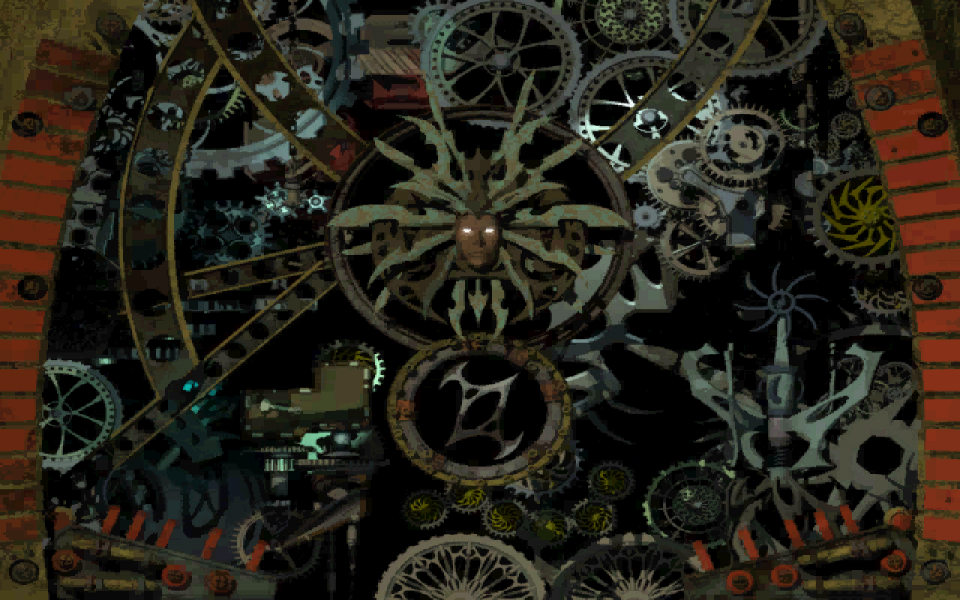
Um... Has Anyone Seen a Floating Sarcastic Skull Around Here?
So that's that for Planescape: Torment. I'll be discussing Project X Zone too at some point, once I'm finally done with the game. That'll almost certainly be a review, though, rather than a whole mess of unfocused musings like Planescape above. I'll be doing my usual Comic Commish at some point next week as well, so I'll see you all then. Thanks for reading.
